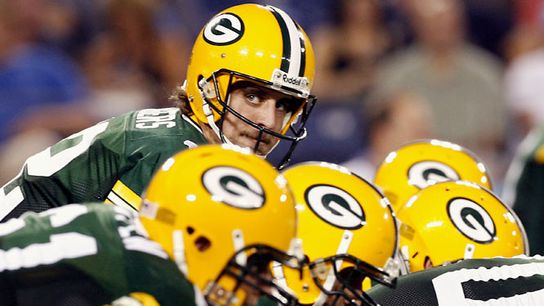Watching an NFL game on your 65-inch TV has never been better. And, in part thanks to that, it's never been harder for an NFL offensive line and quarterback to make a play call.
Because of the constantly-improving technology employed by television networks, microphones both above the field and implanted on both guards have made it clear to the viewer at home what the quarterback and his five cohorts on the line are saying at the line of scrimmage before the snap. And sometimes the viewer at home is next week's opponent, rendering this week's calls useless as soon as the game is over. "With the new microphones on the guards, and the nationally-televised games with the low camera and the mike, it picks up a lot of stuff," Aaron Rodgers told CBSSports.com. "You are constantly changing what words are live and what words are dead. You know the D is watching that for words and cadence, so we have to change it all the time. That part is stupid. It's too much access. Fans like it, so the NFL will keep doing it."
Here's how the Packers' system works: center Corey Lindsey, heading into his rookie season, makes the initial call, then veteran guards T.J. Lang and Josh Sitton chime in with their opinion of the best scheme for that particular play. "It can get hectic," Linsley said. "I'll say we should go over here, and they'll say why not over here. But the words are brief. We use different words for different calls. I have two veteran guys who have been around a long time playing next to me, which really helps."
The linemen may come to a consensus, but Rodgers has the final say, no questions asked. "It has to be that way," Rodgers said. "I need to be comfortable with the final word."
What, exactly, are the words coming out of their mouth? Like Lindsey said, they're brief - "Desk" is a new one the line came up with this year - and, as head coach Mike McCarthy said, two out of every three are dummies. Only the men in green and yellow know which are real and which are not. Which is the entire point, after all. "You would think it's a different language we are speaking," said fullback John Kuhn. "It's kind of like poker, too. We make a call, the defense makes a call and you have to make another call to combat that. Sometimes the first call is fake to make them make a call. Sometimes it's real. It's a cat-and-mouse game out there."
Once a call is agreed upon before the play clock expires - never forget the play clock - it's time to run an NFL play, to move a large, angry man in a direction he does not want to go, or throw a football 40 yards downfield before one of those large, angry men brings you to the ground. And then it's time to do it all over again.
"It's drilled every day. The moving target for us is always communication. That's always changing. The words change a lot, so it's good for players to come up with words for calls and dummy calls. You should never lose a play at pre-snap," McCarthy said. "That's bad coaching if you do."
